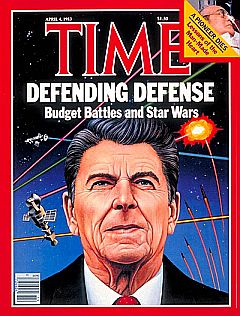Childhood
 • Born to John Edward Reagan (Jack) and Nelle Wilson Reagan on February 6, 1911 in a flat above a local bank in Tampico, Illinois
• Born to John Edward Reagan (Jack) and Nelle Wilson Reagan on February 6, 1911 in a flat above a local bank in Tampico, Illinois • A family legend that his father ran up, looked at his newborn son and said, "He looks like a fat little Dutchman, but who knows, he might grow up to be president someday..."
• Moved a lot due to his father's search for a better life, so he was always the new kid in school and it was not until they had moved 4 times that he found his hometown in Dixon
• In Dixon, Reagan's life was changed, 2 life changing events:
-Mom involved in acting, she and his brother convinced Ronald to join and his first performance turned from nervousness to a life changing event as he continued to pursue his acting career
Teenage Years
• Reagan graduated from Eureka College. He majored in Economics but was determined to pursue a career as an actor.
Step of Success
 • Reagan was accepted into Hollywoods and signed his contract with the Warner Brothers.
• Reagan was accepted into Hollywoods and signed his contract with the Warner Brothers.• While filming the movie Brother Rat, Reagan fell in love with his co-star, Jane Wyman. They got married and had 2 kids, but soon were divorced.
• Reagan became involved in exposing communist in the Screen Actors Guild. Through this, he got to meet his wife Nancy Davis.
• Reagan also worked and represented the General Electric Theathre. It was during his work there that her realized that We the people should be the ones telling the government what to do not the other way around.
Into Politics
• Reagan’s involvement in politics soon led him into becoming the governor of California. Most of the legislature was Democratic, so they didn’t like it that a Republican was telling them how to spend the taxpayers’ money. Reagan surrounded himself with skilled people and got accomplished his goals despite the Democrats. He wanted what was best for the people not for his political establishments.
• As governor of California, Reagan passed the Welfare Reform Act that provided help for the poor who worked for it, since he noticed how a lot of poor kids were seeing their parents get aid without working. He served his intended 2 terms as governor and took a rest knowing that this wasn't going to be his last time serving his nation.








.jpg)




